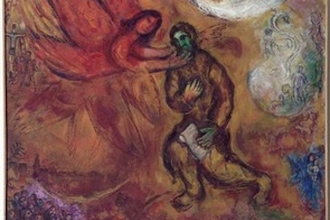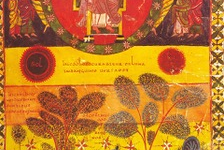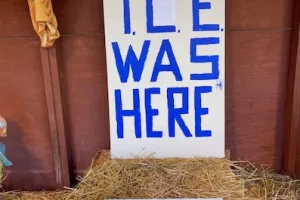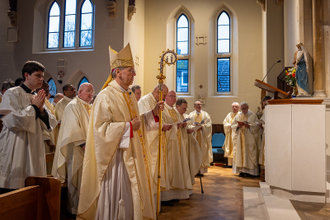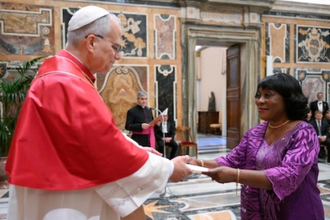Sunday Reflection with Canon Robin Gibbons: September 1st 2024

Image: ICN/JS
Twenty-second Sunday in Ordinary Time
Lectionary: 125
I hope we all know enough about the gospel confrontations between Jesus, his disciples and the Pharisees and scribes, to realise that the passage we hear read to us this Sunday is not about washing hands before meals. I don't know enough about the evidence from archaeology and historical sources of the actions and social mores of Jesus' time, on washing outside of a religious context, to comment on normal hand washing actions.
Yet we can take this confrontation exactly as Mark shows us, a dispute engineered by the Pharisees and scribes to cause trouble.
In some ways it is not entirely their own fault, but it is a faulty religious attitude, one in which their actions and words give Jesus an opportunity to fly a warning flag, shown to us not to condemn so much as call us back to the right way.
This passage from Mark is a reminder that we too can get lost in our own prejudices and insights rather than following to way of God. This is where the conversion of our lives through Christ, that call to metanoia which is the gospel command to repent, believe in Christ and take up and live the gospel is placed before us as our constant trajectory towards the target of the Kingdom.
If we take a closer look at the encounter in this gospel, we can see that the Pharisees and scribes are asking about something that is not really about hand washing but about a 'tradition': Mark situates this in a wider context of following the tradition of the elders: "So the Pharisees and scribes questioned him, "Why do your disciples not follow the tradition of the elders but instead eat a meal with unclean hands?" (Mk 7:5)
Jesus is angry with them because they are missing the real point, and in this sense we need to pay attention because this type of encounter is all too often part of some current religious discourse about what is the true faith. Let's think it through carefully. First of all the Jews believed that the law had been given to them by God through Moses. It is laid before us in our first reading from Deuteronomy 4: "Now therefore, Israel, hear the statutes and ordinances I am teaching you to observe, that you may live, and may enter in and take possession of the land which the LORD, the God of your ancestors, is giving you. In your observance of the commandments of the LORD, your God, which I am commanding you, you shall not add to what I command you nor subtract from it"(Dt 4: 1-2)
Secondly and here the warning is clear for each of us, the Pharisees and scribes are placing their faith in the elders and ancestors, but not in the observance of the commandments of the LORD. There is a confusion in their approach to their understanding of faithfulness. It is true that they are trying to be faithful, following the rules, but from the viewpoint of being faithful to their ancestors and they way they practiced their faith, a tradition based in practice and custom rather than on deeper interpretation of the Law of God. The Pharisees and scribes have muddled things confusion tradition and faithfulness to teachings of the elders with a fidelity to the teaching of God who demands we do not add nor subtract from these commandments. They are not doing what Moses tells them God has asked of them, namely this: "See, I am teaching you the statutes and ordinances as the LORD, my God, has commanded me, that you may observe them in the land you are entering to possess. Observe them carefully, for this is your wisdom and discernment in the sight of the peoples, who will hear of all these statutes and say, "This great nation is truly a wise and discerning people." (Dt 4: 5-6) For ourselves this is a call to examine our own consciences and look at our fidelity to the commandments of the Lord as taught by Jesus and the ways in which we live them.
Jesus finally teaches us a simple and important truth about the way in which evil works, not from outside of ourselves but when we take it into our hearts and then corrupt by living out those hidden sins rooted in our inner disposition. Jesus puts it this way: "But what comes out of a person, that is what defiles. From within people, from their hearts, come evil thoughts, unchastity, theft, murder, adultery, greed, malice, deceit, licentiousness, envy, blasphemy, arrogance, folly. All these evils come from within and they defile."'(Mk7 21-23).
I have often quoted from one of my favourite children's books 'The Little Prince', by Antoine de Saint-Exupery, in it the little Fox, whose own teaching is a simple but profound approach towards friendship shares with us a summation of the antidote to this muddled approach, it is as Jesus points out so often, to listen to Him: "It is only with the heart that one can see rightly; what is essential is invisible to the eye."
Lectio Divina
New International Version
Psalm 15
A psalm of David.
1 Lord, who may dwell in your sacred tent?
Who may live on your holy mountain?
2 The one whose walk is blameless,
who does what is righteous,
who speaks the truth from their heart;
3 whose tongue utters no slander,
who does no wrong to a neighbour,
and casts no slur on others;
4 who despises a vile person
but honours those who fear the Lord;
who keeps an oath even when it hurts,
and does not change their mind;
5 who lends money to the poor without interest;
who does not accept a bribe against the innocent.
Whoever does these things
will never be shaken.
Extract from The Little Prince
by Antoine de Saint-Exupery
'…And he went back to meet the fox.
"Goodbye," he said.
"Goodbye," said the fox. "And now here is my secret, a very simple secret: It is only with the heart that one can see rightly; what is essential is invisible to the eye."
"What is essential is invisible to the eye," the little prince repeated, so that he would be sure to remember.
"It is the time you have wasted for your rose that makes your rose so important."
"It is the time I have wasted for my rose - " said the little prince, so that he would be sure to remember.
"Men have forgotten this truth," said the fox. "But you must not forget it. You become responsible, forever, for what you have tamed. You are responsible for your rose…"
"I am responsible for my rose," the little prince repeated, so that he would be sure to remember.



